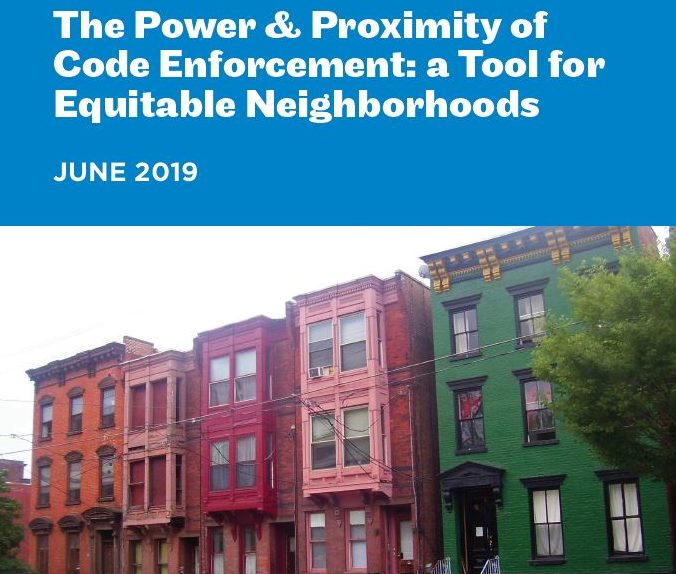Hester Street is excited to announce the release of its report, The Power and Proximity of Code Enforcement: a Tool for Equitable Neighborhoods, as part of our work on Cities RISE, in collaboration with the New York State Attorney General and the Ford Foundation. The NYS AG launched Cities for Responsible Investment and Strategic Enforcement (Cities RISE) in 2017 to build the capacity of municipalities to deal with the aftermath of the housing crisis and to use housing and community data to better engage residents around housing and code enforcement issues in an effective and equitable way.
This important Report brings together our insights, analysis and recommendations on the ways in which equity plays out in different code enforcement scenarios and city contexts, and how they affect the ways cities address issues like unsafe and unhealthy housing conditions, foreclosure, abandonment and more. It provides a framework for thinking about code enforcement as a tool that cities can employ to advance equity and transform the ways in which code departments tackle housing issues in communities impacted by disinvestment, foreclosure and vacancy. Hester Street has applied this framework to working with 10 municipalities across New York State throughout 2018-2019 and has also developed a community engagement toolkit to help these cities conduct vital conversations around code enforcement and housing within their own communities.
Why Does Equitable Code Enforcement Matter?
Disinvestment in low-income neighborhoods and communities of color is the present-day legacy of historic discrimination and unjust housing policies and practices. Many housing policies in U.S. cities reinforced and accelerated racial segregation and have led to low homeownership rates among Black, Latinx and Asian communities; decreased housing values and quality; and increased housing vacancy in communities of color nationwide. Vacant properties, substandard housing and poor neighborhood quality have a deep impact on the economic, physical and social health of cities and its residents. When these issues arise – be it an unsafe roof, illegal dumping or an overgrown vacant lot – the city’s code enforcement department has numerous points of intervention that can influence the impacts of vacant and abandoned properties on the health and safety of residents and businesses.
While code enforcement is a crucial government tool it, like many powerful tools, can only reflect the values and goals of those that wield it. It can be used to intentionally or inadvertently target, penalize and displace vulnerable populations, particularly low-income, immigrant and communities of color. Through our work across New York State, Hester Street has played a big role in developing code enforcement policies that institutionalize equity and build capacity in order to promote practices that preserve neighborhoods, protect renters and low-income homeowners, and increase neighborhood resiliency. We crafted an innovative and collaborative engagement process for communities and residents so that they can begin to understand how these methods and practices impact their housing and neighborhoods every day. It is essential that local governments nationwide recognize that code enforcement policies and practices must be designed to advance equity through proactive protection, increased investment and meaningful civic engagement.
Read more about our methodology, insights and takeaways in this Cities RISE Phase One report.


